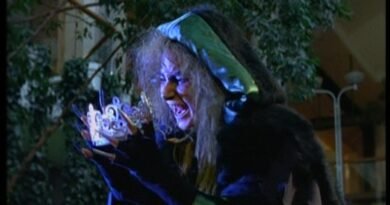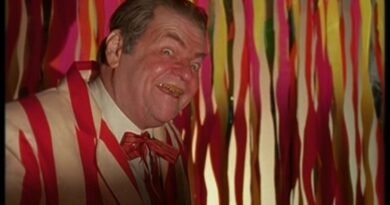Tales from the Darkside: “Printer’s Devil” (S2E16)

“Printer’s Devil” taps into one of Tales from the Darkside’s favourite tropes: deals with dark forces that come at a deceptively low price. This time around, the story focuses on a struggling newspaper and a new employee with some very sinister skills. It blends old-school Faustian horror with commentary on sensationalism, giving us a devilish little morality tale about truth, temptation, and the cost of chasing relevance.
Plot Summary
Harland, a weary editor running a failing local newspaper, is facing the death rattle of print journalism. With subscriptions plummeting and ads drying up, it seems like the only thing left is to pack up the presses. But just as things hit rock bottom, a mysterious stranger named Mr. Smith shows up looking for work.
Smith is a typesetter with a golden touch—his stories seem to break before the news even happens, complete with scandalous detail and shocking accuracy. With Smith on the job, the paper is suddenly a hit again, selling out every issue. But Harland begins to suspect something isn’t right. Smith seems to know things no one could possibly know. And the more Harland investigates, the more he realises his paper might be printing prophecies—or creating them.
What follows is a classic descent into paranoia, as Harland confronts the implications of his success and the demonic source behind it.
What Works
Strong Central Concept
The idea of a newspaper printing the future is inherently compelling, and it’s tied perfectly to the ethical dilemmas journalists face. It’s not just about success or failure, but about what you’re willing to publish to stay afloat. It brings to mind modern debates about fake news and media responsibility, making it feel oddly prescient for an ’80s TV show.
Mr. Smith is Deliciously Sinister
Mr. Smith is a standout character, all quiet menace and knowing smiles. He never overtly threatens anyone, but his every word drips with malice. He’s one of those villains who’s terrifying because he’s so polite. His performance adds gravitas to the episode and keeps the tension simmering.
Moral Ambiguity
Harland isn’t a saint, and the episode doesn’t pretend he is. He wants to save his paper, yes, but he’s also tempted by fame and success. The story becomes more than a simple good vs. evil narrative and instead paints a picture of moral compromise in the face of desperation.
Pacing and Tension
The pacing here is tight. The story builds naturally from hopeful resurgence to creeping dread. Each new headline feels like another turn of the screw, with Smith slowly revealing just how much control he has.
What Doesn’t Work
Some Predictability
Like many Faustian tales, the twist is easy to spot a mile away. If you’ve seen any story where a character gets everything they want from a mysterious benefactor, you probably know where it’s headed.
Limited Visual Flair
Much of the episode is confined to newspaper offices and print rooms, which keeps things visually grounded but a little dull. Given the supernatural implications of the story, a more surreal or dramatic visual style could have enhanced the impact.
Underused Supporting Characters
Harland and Smith take up most of the screen time, which makes sense, but other characters, such as coworkers or townspeople reacting to the paper’s stories, feel like set dressing. A bit more world-building around how the public reacts could have added depth.
Themes: Temptation, Truth, and the Media Machine
“Printer’s Devil” explores the dark side of journalism: the temptation to publish stories that grab attention, no matter the cost. It also plays with the idea of foreknowledge as a corrupting force. If you could predict the future, would you warn people? Exploit it? Profit off tragedy?
There’s also a clear Faustian theme here, with Smith as the devil offering success in exchange for integrity. Harland’s slow realisation that he’s losing his soul (and maybe more) to this bargain is the core of the episode.
Final Thoughts: A Devilishly Good Deal with a Familiar Cost
“Printer’s Devil” doesn’t reinvent the horror wheel, but it uses a tried-and-true template effectively. It’s a strong morality tale, bolstered by a great villain and a relevant message about the dangers of unchecked ambition in the media world. The horror here is less about demons and more about what we become when we stop questioning the price of success.
Who Would Enjoy This Episode?
- Fans of classic morality horror tales
- Viewers who enjoy psychological horror over gore or action
- Anyone interested in media ethics and supernatural storytelling
Who Might Not Enjoy It?
- Those who want faster-paced or more visually dynamic horror
- Viewers tired of Faustian narrative structures
- Anyone hoping for a big, shocking twist
Final Verdict: Stop the Presses… and Maybe Burn Them
Smart, eerie, and more relevant now than ever, “Printer’s Devil” delivers a devilish look at the cost of success in a world where information is power. Just don’t read tomorrow’s headlines too closely—they might be about you.




